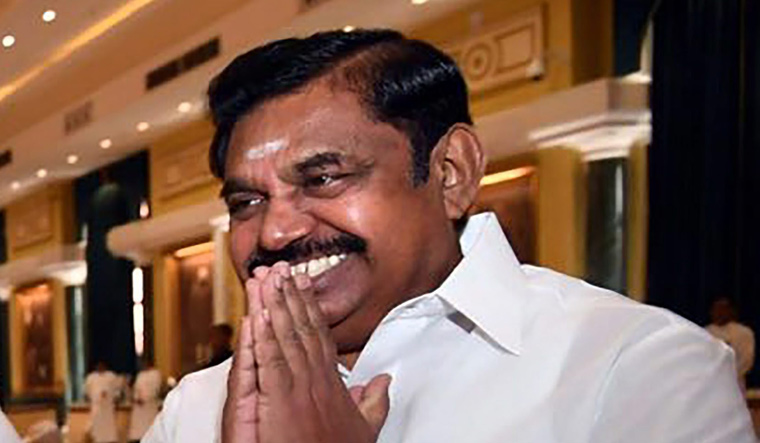He was not the chosen one of Jayalalithaa. He was always respectful, bowing down to touch her feet as a mark of loyalty whenever the situation called for the gesture. Fortune favoured him three months after she died, and by a twist of fate, he became the chief minister of Tamil Nadu.
Clad in a simple white dhoti and a white shirt with a dash of ash on his forehead, the ever-smiling Edappadi K. Palaniswami has made every politician in the state green with envy by his ascension to the chair of chief minister.
Those who watched the debates and discussions on the floor of Tamil Nadu assembly for the past one month would realise that he has comfortably stepped into the shoes of his late leader. In a state where sycophancy is the order of the day, MLAs miss no chance to lavish praises on him. Saleththu singam (lion of Salem), Irumbu dhesathin karumbu manithar (sugarcane man of iron nation) and Indiavin irandaam irmbu manithar (India's second iron man) are a few of the sobriquets accorded to the chief minister. The praises heaped on him and the slogans raised do show that Palaniswami is gradually graduating from being the recipient of a legacy to a legend.
Also Read
- From an aide of Jayalalithaa to a fervent fan of Modi, Nainar Nagendran’s long run in TN politics
- Watch: Amid ‘Mughal mindset’ jab, Rahul Gandhi shares a ‘sweet moment’ with TN CM Stalin
- In Theni, T.T.V. Dhinakaran makes the battle tough for ruling DMK alliance
- BJP continues to vie for Tamil Nadu votes; Modi in the state for a sixth time this year
- DMK was party to Katchatheevu negotiations with Sri Lanka: Jaishankar
Palaniswami has proved his detractors wrong by surviving as chief minister for over 16 months after Jayalalithaa passed away and Sasikala went to prison. Despite revolts by O. Panneerselvam and T.T.V. Dhinakaran, EPS, as he is popularly known, managed to keep the flock together both in the cabinet and in the party. It is also gossiped in the corridors of power in state secretariat that it is Palaniswami who managed to broker peace between the BJP and the AIADMK while also ensuring that Panneerselvam is not the favourite of the Delhi BJP top brass. The party under him got back the two-leaf symbol. Now, it has a new constitution in place according to which the party, for the first time in its history, will have two leaders—a coordinator and a joint coordinator.
Palaniswami is now the undisputed leader of the ruling AIADMK. In fact, the chief minister appears to have lifted a few pages from Jayalalithaa’s 'autocracy book'. For the MLAs who are used to genuflecting before Jayalalithaa and lavishing praises on her, cheering Palaniswami could very well be a blast from the past. Besides praising him on the floor of the assembly, every minister in his cabinet, including Panneerselvam, walks up to his chamber in the secretariat to greet him before debates and discussions of their departments come up in the assembly.
However, the people of Tamil Nadu do see him as a leader who takes pleasure in the sycophantic behaviour of the MLAs and partymen, and, in the process, strives to acquire the demi-god status that Jayalalithaa enjoyed. An ad film produced by the government’s films division, which called him 'sami' and the 'saviour of the masses', became the butt of jokes. Subsequently, the film was removed from theatres. Palaniswami, however, seems to unperturbed by these jokes and the many memes in the social media.
While trying to inherit the 'autocratic leader' tag from Jayalalithaa, Palaniswami seems to have gone a step further than his late leader. What the former chief minister was always flayed for, is now a tool for Palaniswami. In the budget session that ended on Monday, Palaniswami read out at least 34 statements under Rule 110 (announcements made under Rule 110 can only be welcomed and are not open for debate). This was the tool used by Jayalalithaa to present any scheme in the assembly for which she would not wish any opposition or a debate or discussion.
Dissent, like in Jayalalithaa’s regime, is not taken lightly by Palaniswami. During her last tenure as chief minister, Jayalalithaa had slapped sedition charges on people like folk singer Kovan and went on to file at least 55 defamation cases. Just like Jayalalithaa, Palaniswami makes use of two weapons—criminal defamation and arrest—to quell protests, be it the agitation at Thoothukudi or the stir against Chennai-Salem highway. After activist Piyush Manush, actor Mansoor Ali Khan, student activist Valarmathi and many farmers, it was former MLA K. Balabharathi who was taken into custody for meeting people who were opposing the Chennai-Salem highway project. He was quick to justify the arrest saying she was only granted permission to meet people, but she spoke to them and incited them to agitate.
There are traits, however, that make him notably different from his predecessor. The most prominent is his approach to the Centre. While Jayalalithaa strongly opposed NEET exams, GST, UDAY scheme, the AIADMK under Palaniswami has sung a different tune.
Palaniswami may be the simplest leader—unlike his predecessors M.G. Ramachandran, M. Karunanidhi or Jayalalithaa who had a larger than life persona—the state may have witnessed in a long time. He may be a staunch follower of his 'Amma', invoking her name in every scheme he launches and every sentence he utters. But inheriting her autocratic tendencies may not do him good in the long run.


